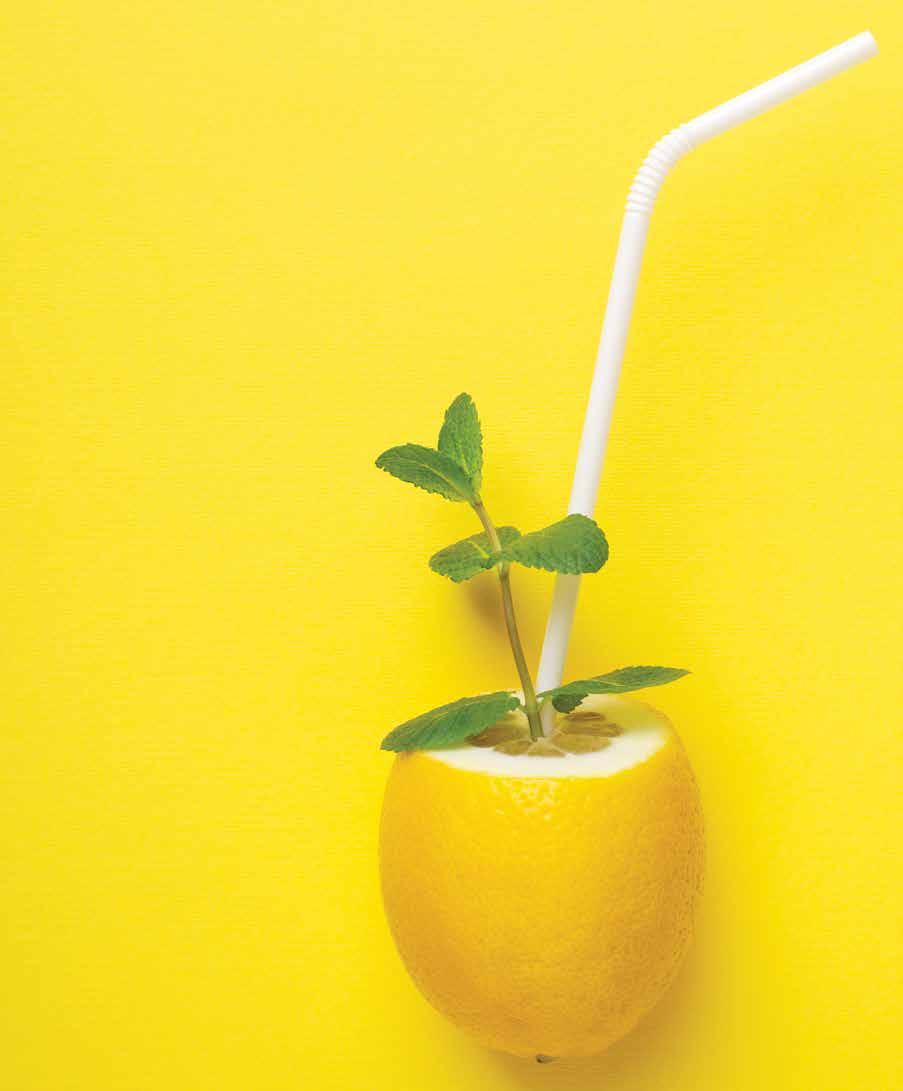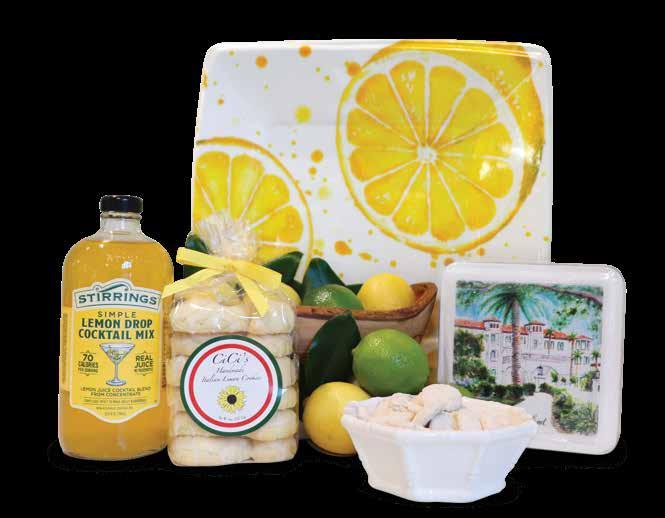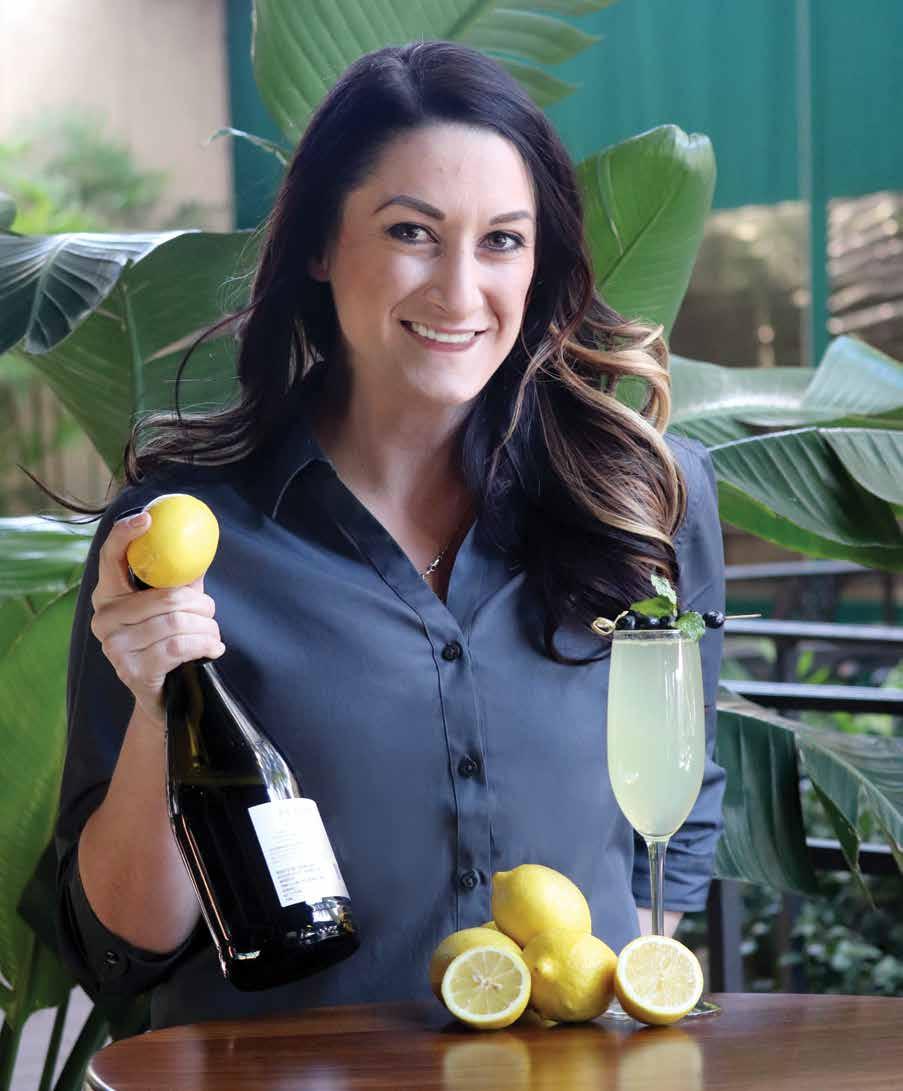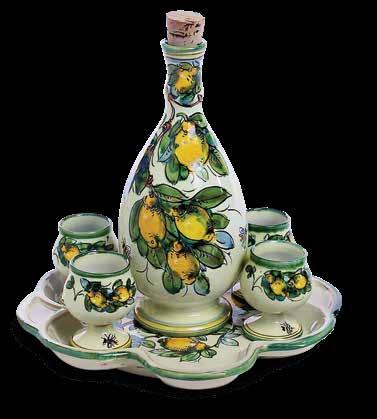
10 minute read
Pucker Up


When Life
gives you lemons pucker up!
What would we do without lemons? These tart yellow juicy bits of sunshine have been brightening our lives since ancient times. We twist them into our water and sweet tea almost without thinking. We use cleaners, candles, and diffusers with their fragrance to make our homes smell fresh and clean. Here on the coast where seafood is plentiful, they’re always on hand to flavor our fish and spritz over the Wild Georgia shrimp in our Low Country boils. And is a summer picnic even a picnic without lemon bars or a lemon pound cake? We embrace happy lemon color tones in our home décor and in our wardrobe, especially as we move into spring. Outside the home, we’re lucky enough to live in a region where lemons fare well and can be planted in the yard or grown in containers on sun porches.
So what’s the difference between an ordinary lemon and a Meyer lemon? When people talk about “regular” lemons, they are generally referring to Eureka or Lisbon lemons, the two most common lemon varieties found in the produce section of your local grocery store. The fruit
Citrus always makes for an attractive subject in a still life. Jar of Lemons by Loren DiBenedetto and other fine art by this artist as well as many others are available at Anderson Fine Art Gallery, located at 3309 Frederica Rd. You can see a catalog of artists and selected works at andersonfineartgallery.com

is easily recognized by their large size, thick, textured, bright, sunny skin, and medium yellow pulp. These lemons are highly acidic, meaning they have a tang and sour taste that makes your mouth pucker. Regular lemons are available year-round, because the trees have no season and can bear fruit all year, although some seasons yield more fruit. These lemons are grown commercially, whereas the Meyer lemon remains a local grown specialty if you’re lucky enough to live in a warm, sunny climate like the Golden Isles.
Meyer lemons were first introduced to the United States from China in the early 20th century by USDA plant explorer Frank Meyer, from whom they also got their name. He discovered the plant growing as a dooryard tree in Beijing, China in 1908. This sweet winter citrus is thought to be a lemon-mandarin or a lemon-orange hybrid. The trees produce medium sized, practically seedless, almost sweet, juicy lemons. Meyer lemons have a rounder shape than regular lemons, with smoother, thin, deep yellow to orange skin, and dark yellow to pinkish pulp (depending on soil and climate). They are less acidic and lack the tang of regular lemons. Their rinds give off a more herbal, spicy citrus scent and taste. The fruit can be eaten raw, and is often used for flavoring, in making juices, and desserts. It makes excellent lemonade!
Although they tolerate cold well, the Meyer lemon has a soft thin skin that doesn’t tolerate transportation well. For this reason it’s not used for commercial production, industrial use, or food processing. If you’re not growing your own or have a generous friend or neighbor with a tree or two, you may occasionally find the fruit in a local farmers’ market. More seasonal than regular lemons, you’re most likely to find them between December and May. They thrive in Southern gardens and as ornamental container pots if given a sunny spot to grow and protected from hard freezes.

When Life
gives you lemons
Not only does lemon taste good, it’s good for you! The vitamins, fiber, and plant compounds in lemons provide essential health benefits. The pulp, rind, and juice are rich with vitamins that stimulate immunity and reduce the risk of disease. The soluble dietary fiber in lemon also aids in healthy digestion.
Lemon and other fruits are an excellent source of vitamin C, a nutrient that strengthens the immune system and keeps your skin smooth and elastic. Lemons contain about 31 grams of Vitamin C, which is nearly double the amount of Vitamin C needed in your daily diet. Citrus fruits are also a rich source for other vitamins and minerals that your body needs to function properly, including B vitamins, potassium, phosphorous, magnesium and copper. Additionally, they are rich in plant compounds that have various health benefits, including anti-inflammatory and antioxidant effects. These compounds include over 60 varieties of flavonoids, carotenoids and essential oils, and are responsible for many of citrus fruit’s health benefits.
Along with boosting immunity, this burst of Vitamin C lemons provide can reduce the risk of stroke and heart disease with regular consumption. Additionally, soluble dietary fiber, which lemons have in abundance, has been proven to reduce risk factors for heart disease by lowering LDL or bad cholesterol. A surplus of cholesterol can lead to atherosclerosis, a hardening of the arteries within the heart. The pectin fiber found in lemons expands once it is ingested, making you feel full sooner and longer. Although lemon water is often touted as an effective tool in weight loss and weight management, results in humans have not been proven. Simply drinking water may keep you full and help you avoid snacking as effectively as lemon water, although maybe the taste of lemon water induces you to drink more of it.
Lemon can also help your body absorb more iron from plant-based foods in your diet. Maintaining proper iron levels is important to help prevent anemia. A lower than average number of red blood cells is often the result of iron-deficiency. Lemons can help prevent the formation of kidney stones. Kidney stones are painful mineral crystals that can form when your urine is very concentrated or has higher-than-normal amounts of stoneforming minerals. Low levels of citrate in urine can cause kidney stones. Lemons and other citrus fruits, can lower the risk of stones by raising the levels of citrate in urine. Drinking citrus juices and eating citrus fruits can provide a natural alternative to potassium citrate supplements.
Studies have suggested that citrus fruits may protect against several types of cancer. These fruits contain numerous plant compounds, including flavonoids that act as antioxidants and may block the expression of certain genes that are responsible for some degenerative diseases, including cancer. Citrus fruits may also help suppress cancers, blocking the formation of new cancers and rendering carcinogens inactive. Grab a glass of lemonade and drink to your health.

Here are a few simple recipes that highlight the zesty appeal of both varieties of lemon.
Meyer Lemon Dijon Chicken
INGREDIENTS:
1 whole chicken, cut into parts 4 Meyer lemons 1 c. Dijon Mustard 2 Tbsp. chopped fresh rosemary, plus a few whole sprigs 1 tsp. crushed red pepper flakes 2 Tbsp. olive oil Salt and pepper to taste
PREPARATION:
In a large bowl, mix together Dijon mustard, juice, and zest from two Meyer lemons, chopped rosemary, pepper flakes, olive oil, and salt and pepper. Whisk until well combined. Place chicken in a 9x13” baking dish. Brush the mixture over the chicken; leaving a couple of tablespoons to re-apply while roasting. Cover chicken with plastic wrap and refrigerate for at least 2 hours up to overnight. Preheat oven to 400°F. Slice one Meyer lemon and place slices on top of chicken. Squeeze juice from remaining lemon all over chicken and top with a few sprigs of rosemary. Roast chicken 40-45 minutes until internal temperature reaches 165°F. Remove chicken from pan and serve with sides of your choice.
Lemon Garlic Shrimp and Pasta
INGREDIENTS:
½ lb. (8 oz.) angel hair pasta, cooked according to package directions ½ c. unsalted butter 2 cloves garlic, finely minced 1 lb. large Wild Georgia shrimp, peeled, de-veined ½ tsp. salt ½ tsp. pepper ¼ c. lemon juice 1 tsp. lemon zest
Cook pasta according to package directions, drain and set aside. Add butter to large skillet and heat on medium-high until melted. Stir in minced garlic to sautée. Add shrimp, season with salt and pepper, and cook for about 2 to 3 minutes total, flipping shrimp once while cooking. Shrimp will be done when it just turns pink and is cooked through. Don’t overcook! Add lemon juice, lemon zest, and
stir briefly to combine. Turn heat to low, add cooked pasta to skillet with shrimp, and toss to coat. Season as needed and serve.

INGREDIENTS
FOR CRUST:
1 c. unsalted butter, cold, cut in small pieces ½ c. sugar 2 c. flour
FOR LEMON LAYER:
1½ c. sugar ¼ c. flour 4 eggs 2 lemons – to make approx. ¾ cup juice zest from lemons, very finely chopped
PREPARATION:
In a food processor, blend together butter, sugar, and flour. Press evenly into bottom of a greased and parchment paper lined 9×13” baking pan. Bake for 20 minutes at 350°F (325°F if you are using glass pan). Top edges should be just starting to brown at the edges. For lemon topping, whisk together sugar, flour, eggs, zest and lemon juice until sugar is dissolved. Allow topping to sit for approx. 10 minutes before whisking again and pouring over baked shortbread base. Bake at 350°F for 20-25 minutes or until top is slightly browned and custard appears to be set. Cool completely. Sprinkle with powdered sugar when cool.
OPPOSITE PAGE: “Spritz Me, Baby, One More Thyme.” This refreshing lemony cocktail being served up by Calli McPherson and the friendly crew at Tramici combines Caravella limoncello, Tanqueray gin, Prosecco, and thyme-infused simple syrup. Cheers!
LEFT: Add some sunny citrus to your cocktail hour by loading this fun lemon tray with drinks made using Stirrings Simple Lemon Drop Cocktail Mix, and a dish of Cici’s Handmade Lemon Cookies and Key Lime Coolers from Byrd’s Cookie Company. You can find these treats at The Market at Sea Island, 351 Sea Island Road.


For the Love of Limoncello
An excellent way to make good use of the bounty of prolific Meyer lemon trees is to make limoncello. In case you’re unfamiliar with it, limoncello is a sweet liqueur made by Italians from the oil essence of skins from the lemons grown abundantly in the Mediterranean regions. Homemade limoncello is everywhere in Italy, as very few people buy it from a store. Italian restaurants usually make their own and often serve guests a complimentary limoncello after a delicious meal, as a digestivo, something to sip while your meal digests. Here in the states, a bottle can be pricey, so if you have fresh lemons, make your own!
You’ll only need a few simple ingredients: a 750 ml. bottle of vodka (an inexpensive, non-potato brand like Smirnoff is good), 16 fresh lemons, preferably organic, and granulated white sugar. You’ll also require clean glass bottles with stoppers or tops to store or gift it.
The first step is to infuse the vodka. Using a veggie peeler, lightly peel the skin from the lemons. Avoid digging too deep and peeling the white pith under the skin, try to get only the outer lemon skin. Add vodka to the lemon skins in a glass container. Cover with plastic wrap or an airtight lid, and let sit in a cool place for at least 4 weeks. The longer it steeps, the better it will taste, so it’s worth the wait! Make simple syrup by dissolving 1½ cups of white sugar in 2½ cups of water, heating until sugar dissolves completely.
Set the syrup aside to cool. At the end of 4 weeks, remove peels from the vodka with a strainer and discard. The infused alcohol will be a bright lemony yellow. Filter by pouring through a cheeseclothlined sieve into another large glass container. Strain once or twice to remove smaller bits of lemon. Combine the infused vodka with the cooled simple syrup. Mixture will turn slightly cloudy. Transfer into smaller bottles, if desired. The finished limoncello will keep for a year or more in the freezer. It can be enjoyed sipped in small cups or used in martinis and spritzers.

LOCATED IN THE BEAUTIFUL GOLDEN ISLES,
this Love Golf Design/Fred Couples Signature course, is truly a unique and captivating semiprivate golf facility. By working with the natural features of the land, Couples has created a layout that is both challenging and fun, and one that golfers will never tire of playing. After your round, have a seat at the bar or visit our dining room for a complete dining experience. Live music & dinner specials on Friday nights!
“Sanctuary Golf Club has the best collection of par 3s of any course that I have played.” – Fred Couples










